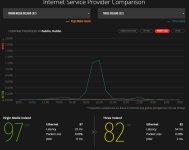When you said 'We' who did you mean? Are you part of an ISP? Can you say which one? If you are from an ISP, or some official in some capacity, what do you make of the two articles I posted? They are saying the opposite to what you're saying.
I work for one of the worlds largest online game studios, and we have over 100 million people playing our games monthly. We collect telemetry from each player, cross-reference that with whichever ISP they're coming from, along with a whole load of other data science stuff, from that we can measure their performance by the second, and quality of experience, be it their ping, jitter (ping variation) or packet loss, disconnects and many other things.
Because we have such a huge cross-section of people connecting, we get a very good range of results that we can look at, and because our traffic is very sensitive to congestion, we're probably going to detect congestion before anybody else, because very few people have the level of insight that we have.
I don't really want to go into a deep technical dive about how broadband networks work, (unless you want me to). The main problem with the article, is that it's mostly talking about backbone and internet congestion (such as the linx graphs) the bottom line is, it's quite cheap and easy to add extra capacity in places like that, because in EU and NA - bandwidth is cheap. However - internally on the broadband side it's not so simple. Most ISPs build their networks in an oversubscribed model, in the sense that they oversubscribe the access-side of the network, rather than the external internet facing side, and it's here where the biggest bottleneck normally occurs, and it's a lot harder and more expensive to add capacity there.
I can tell you from our own telemetry, that most of the EU and some UK ISPs see a tremendous ping spike, around 6pm-9pm, where some of the pings go from 20-40ms, up to 80-100ms along with packet loss. Yet all of the peering links we have with those ISPs aren't even close to congested, they're only running at perhaps 40-70% used.
When the players complain, many of them are quite tech savvy and send us traceroutes in complaining - when we look at the traceroutes, we quite often see high-latency in the first 2-3 hops of the traceroute, which almost always points to a congested BNG node, (the ISP's broadband server) rather than congestion on the internet itself. If the BNG node is congested, then absolutely everything going back to all the broadband subscribers will be seeing some sort of impact to their performance.
On Vodafone - our metrics show Vodafone is handling it pretty well, and lets face it - their CTO is never going to come out in public and go "We don't have enough capacity, all our customers are suffering" is he?







